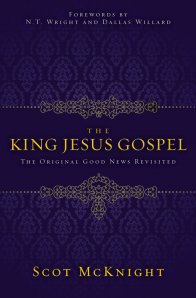 Scot McKnight recently wrote a book called The King Jesus Gospel
Scot McKnight recently wrote a book called The King Jesus Gospel. I finished reading it yesterday.
I know it is vain, but as I read it, I kept waiting for him to quote from a journal article I wrote back in 2006 called “The Gospel is More than Faith Alone in Christ Alone.”
Of course, Scot McKnight never did quote from it.
So either he plagiarized me, or he never read the article… Hmmmm… I wonder which one it is?
The Gospel is about more than How to get Saved
In the 2006 journal article, I studied the New Testament usage of the word “gospel” and ended up concluding that
The gospel contains everything related to the person and work of Jesus Christ, including all of the events leading up to His birth, and all the ramifications from Christ’s life, death, and resurrection for unbelievers and believers.
Then, in 2009, in a blog post titled “The Gospel is Full of Good News” I stated that
The full gospel is full-orbed in the claims it makes about our present life and eternal existence, and what Jesus wants to do with both.
Later, I did a whole series on “Gospelism” (Part 1, Part 2, Part 3, Part 4, Part 5, Part 6) in which I argue many of the points that Scot McKnight made in his book, but which he referred to as “Gospeling.”
As I was reading Scot’s book, it often felt to me that I was re-reading some of those old posts.
Sure, Scot McKnight and I don’t argue along exactly the same train of thought, and he nuances things differently than I did, but in general, we are in agreement. I found this very comforting, since in 2006, some people blasted me pretty hard for the article I had written. I imagine Scot might be taking flak also. People don’t like their “gospel message” to be challenged.
Anyway, this is supposed to be a review of his book, and so far, it’s all about me… I told you when I started it was vain…
So I will write a different post tomorrow as an actual review, since this one is already too far gone…

The Point of the Gospel
The point is this: Stop thinking that when you share the Four Spiritual Laws, or the Romans Road, or the plan of salvation, or given an altar call, or invite someone to believe in Jesus for eternal life, or any of the other myriad of things that Christians today call “sharing the gospel,” stop thinking that you have actually shared the Gospel. Because you haven’t.
The Gospel includes an offer of eternal life, it includes a message about the forgiveness of sins, it includes facts about the death and resurrection of Jesus, but these by themselves are not the entire Gospel.
The biblical Gospel is much bigger than just our eternal life, the forgiveness of our sins, justification, or getting to heaven when we die.
Instead, the Gospel is a story about God creating the universe, and mankind entering into rebellion against God, and so God choosing to set apart a people for Himself who will set in motion a plan to restore and redeem the universe, but just when this plan seems to go terribly awry, God sends Jesus, His only Son, to complete and fulfill the plan through His miraculous birth, life, miracles, teaching, death, and resurrection. But even this was not the end of the Gospel. Jesus, began the story afresh in himself, and created a new people of God who must carry on the plan and purposes of God for the world and for the universe, both now and for all eternity.
And this, as brief as it is, is only the most pitiful and briefest summary of the Gospel that I can muster. Scot McKnight’s book was a great reinforcement for what I have been thinking and writing about for these past six years. I will talk more about his book in an actual review tomorrow.
Until then, what do you think about this view of “the Gospel”?



That’s a very concise picture. 🙂
I have, for a long time )even growing up in church) thought that the ‘gospel’ most churches present is not accurate. OF course, I grew up in a denominational flavor that viewed sharing the gospel as telling people they were wicked sinners going to hell and they better repent now (falling just short of calling people stupid if they don’t). It was never very effective and I resisted the mandate to go in the streets and share this with the very core of my being, feeling guilty that I did not want to ‘share the gospel’. It’s much easier to hear when presented as good news instead of bad….
Yes, and it is not just good news about “pie in the sky, by and by, when we die” but about all the promises and purposes of God for earth (and the universe) being fulfilled in Jesus. And God invites us to participate with Him in this grand endeavor.
Pretty exciting, right?
Exactly!
You know, I have a friend who was a head-banger – long hair, etc. He found himself in a church one morning, felt the power of God during the altar call – was shaking under that power and ready to commit….and the pastor looked at him, pointed his finger and said. “God won’t accept you looking like a girl. You go and cut you hair and dress like a real man. Then you can come back here and I’ll pray for you.” My friend walked out angry and confused and told God if that was what it was to be as Christian, he wanted nothing to do with it. Nine years later, he finally met some real Christians and did get saved, but man…..
I have longish hair, and I had a guy tell me last week that according to what Paul wrote in 1 Corinthians, my hair was an abomination to God.
Of course, what he was (incorrectly) referring to was 1 Corinthians 11:14 where it says that it is shameful for a man to have long hair.
There were numerous cultural reasons for why Paul said this which do not apply today, but even if it did, I don’t mind my long hair being shameful. It reflects one of the reasons I grew it out… which is another story…
I know Christ followers who view the “say the sinner’s prayer and get saved” version/understanding of the Gospel (and the mindset the usually goes with that set of beliefs) as a strange perversion of the Gospel. What do you think?
I can see their point….
I can see their point also. Such a practice is not mentioned anywhere in Scripture as part of the Gospel or how to respond to it. Though I am not sure I would call it a perversion. Just a misunderstanding of what the Gospel is and how to respond to it.
I think there is a good discussion of this exact question going on at Scot McKnight’s Jesus Creed blog right now…